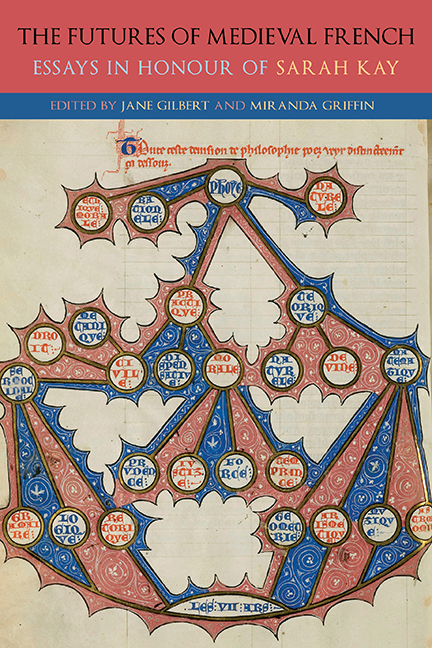Book contents
- Frontmatter
- Dedication
- Contents
- List of Illustrations
- List of Contributors
- List of Abbreviations
- Introduction
- Part I Subjectivity in Troubadour Poetry
- Part II The ‘Chansons de geste’ in the Age of Romance: Political Fictions
- Part III Courtly Contradictions: The Emergence of the Literary Object in the Twelfth Century
- Part IV The Place of Thought: The Complexity of One in French Didactic Literature
- Part V Parrots and Nightingales: Troubadour Quotations and the Development of European Poetry
- Part VI Animal Skins and the Reading Self in Medieval Latin and French Bestiaries
- Afterword
- General Bibliography
- List of Manuscripts
- Bibliography of Work by Sarah Kay
- Index
- Gallica
Introduction
Published online by Cambridge University Press: 27 May 2021
- Frontmatter
- Dedication
- Contents
- List of Illustrations
- List of Contributors
- List of Abbreviations
- Introduction
- Part I Subjectivity in Troubadour Poetry
- Part II The ‘Chansons de geste’ in the Age of Romance: Political Fictions
- Part III Courtly Contradictions: The Emergence of the Literary Object in the Twelfth Century
- Part IV The Place of Thought: The Complexity of One in French Didactic Literature
- Part V Parrots and Nightingales: Troubadour Quotations and the Development of European Poetry
- Part VI Animal Skins and the Reading Self in Medieval Latin and French Bestiaries
- Afterword
- General Bibliography
- List of Manuscripts
- Bibliography of Work by Sarah Kay
- Index
- Gallica
Summary
THE PLACE OF Thought is one more example of Sarah Kay's inventiveness and bold theoretical bent in the reading of medieval texts – here the Occitan and French ‘didactic literature’ of the later Middle Ages. Kay has always risen to the challenge of tackling what might look like familiar works and genres from new angles. What also marks out her work, however, is the degree to which she believes that the literature is up to the challenge. Kay is utterly uncompromising in her use of both medieval philosophy and modern theory to read this literature – and in her belief that the literature is sufficiently robust in its self-understanding and internal logic to talk back. This seriousness and lack of condescension marks out the very best readers of the literature of the Middle Ages, and Sarah Kay is one of them.
If Kay's first book, Subjectivity in Troubadour Poetry, was a reaction against the structuralist turn in the reading of the medieval lyric, there is also a sense in which she has never ceased thinking structurally, not only about texts in general, but also about subjectivity. I recall a conversation many years ago at the Cambridge medieval reading group in which she (rightly) emphasised that views about the possible social or medical dysfunctionality of the fifteenth-century English woman Margery Kempe were entirely irrelevant to what Kempe's Book could tell readers about the social and religious structures within which Kempe experienced the world. It can be no coincidence that so much of Kay's work on the human subject has actively avoided approaching texts via theories of psychology, intentionality, or voice, and has worked instead to identify other structures that shape textual meaning – whether socially and historically situated, gendered, psychoanalytic, ‘animal’, textual, or manuscript. If some of these structures are occluded by texts’ explicit meanings and require some kind of excavation (gender, the psychoanalytic, the human/non-human animal relation), one of the features that makes Kay's work so engaging is that many of the structures that interest her are graphically apprehensible on the surfaces of her texts (the lady as midons, tombs, skin, trees, quotation).
Kay was kind enough to note that The Place of Thought was partly inspired by a chance remark of mine that ‘monologism might be more challenging than dialogism’.
- Type
- Chapter
- Information
- The Futures of Medieval FrenchEssays in Honour of Sarah Kay, pp. 181 - 184Publisher: Boydell & BrewerPrint publication year: 2021

